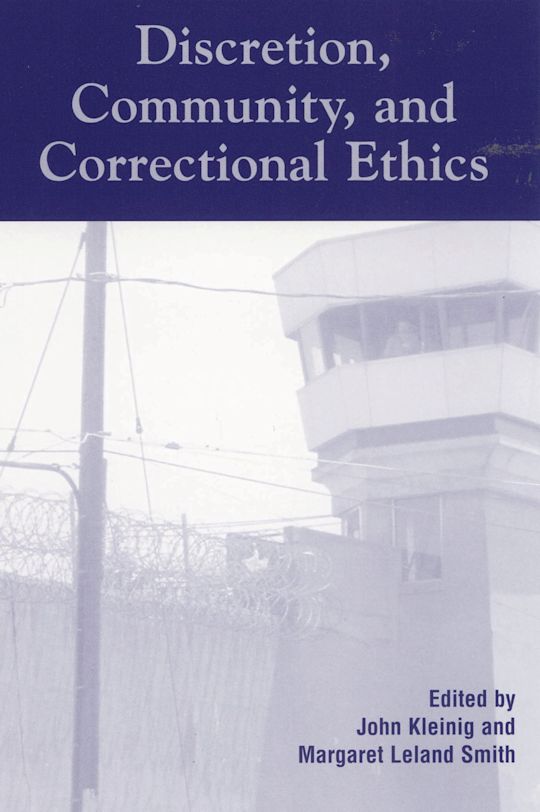- Home
- ACADEMIC
- Sociology
- Sociology - Other
- Discretion, Community, and Correctional Ethics
Discretion, Community, and Correctional Ethics
John Kleinig (Anthology Editor) , Margaret Leland Smith (Anthology Editor) , Heather Barr (Contributor) , Audrey J. Bomse (Contributor) , Derek R. Brookes (Contributor) , Todd R. Clear (Contributor) , William C. Heffernan (Contributor) , Zelma Weston Henriques (Contributor) , Michael Jacobson (Contributor) , Kenneth Kipnis (Contributor) , John P. Pittman (Contributor) , Polly Ashton Smith (Contributor) , Joseph V. Williams (Contributor) , Kevin N. Wright (Contributor)
Discretion, Community, and Correctional Ethics
John Kleinig (Anthology Editor) , Margaret Leland Smith (Anthology Editor) , Heather Barr (Contributor) , Audrey J. Bomse (Contributor) , Derek R. Brookes (Contributor) , Todd R. Clear (Contributor) , William C. Heffernan (Contributor) , Zelma Weston Henriques (Contributor) , Michael Jacobson (Contributor) , Kenneth Kipnis (Contributor) , John P. Pittman (Contributor) , Polly Ashton Smith (Contributor) , Joseph V. Williams (Contributor) , Kevin N. Wright (Contributor)
You must sign in to add this item to your wishlist. Please sign in or create an account
Description
Some two million Americans are in jail or in prison. Except for the occasional exposZ, what happens to them is hidden from the rest of us. Is it possible to develop and instill a professional ethic for prison personnel that, in partnership with formal regulatory constraints, will mediate relations among officers, staff, and inmates, or are the failures of imprisonment as an ethically-constrained institution so deeply etched into its structure that no professional ethic is possible? The contributors to this volume struggle with this central question and its broader and narrower ramifications. Some argue that despite the problems facing the practice of incarceration as punishment, a professional ethic for prison officers and staff can be constructed and implemented. Others, however, despair of imprisonment and even punishment, and reach instead for alternative ways of healing the personal and communal breaches constituted by crime. The result is a provocative contribution to practical and professional ethics.
Table of Contents
Part 2 Preface
Chapter 3 1 Professionalizing Incarceration
Part 4 Response: The Shimmer of Reform: Prospects for a Correctional Ethic
Chapter 5 2 The Possibility of a Correctional Ethic
Part 6 Response: The Case for Abolition and the Reality of Race
Chapter 7 3 Prison Abuse: Prisoner-Staff Relations
Part 8 Response: Correctional Ethics and the Courts
Chapter 9 4 Health Care in the Corrections Setting: An Ethical Analysis
Part 10 Response: First, Do No Harm
Part 11 Response: Brokering Correctional Health Care
Chapter 12 5 Ideology into Practice/Practice into Ideology: Staff-Offender Relationships in Institiutional and Community Corrections in an Era of Retribution
Part 13 Response: Moral Reckoning and the Social Order of the Prison
Part 14 Response: The Path of Least Resistance: Sexual Exploitation of Female Offenders as an Unethical Corollary to Retributive Ideology and Correctional Practice
Chapter 15 6 Management-Staff Relations: Issues in Leadership, Ethics, and Values
Part 16 Response: The Ethical Dilemmas of Corrections Managers: Confronting Practical and Political Complexity
Part 17 Additional Resources
Part 18 Indexes
Part 19 About Contributors
Product details
| Published | 28 Aug 2001 |
|---|---|
| Format | Ebook (Epub & Mobi) |
| Edition | 1st |
| Extent | 272 |
| ISBN | 9780742577138 |
| Imprint | Rowman & Littlefield |
| Publisher | Bloomsbury Publishing |
About the contributors
Reviews
-
In this book, John Kleinig and Margaret Leland Smith, two well-known and insightful thinkers in the criminal justice ethics field, offer readers an exciting look at cutting-edge issues in correctional ethics. Contributions to this edited volume are first-rate and highlight the moral dilemmas faced by society, correctional personnel at all levels, and by those who are sentenced under American criminal law today. This excellent book misses nothing; with topics ranging from a discussion of whether a workable correctional ethics is even possible, to a consideration of moral issues involving gender and race.
Frank Schmalleger, Ph.D., The University of North Carolina at Pembroke
-
Discretion, Community, and Correctional Ethics has a refreshingly large sense of the terrain of correctional ethics-something all too frequently absent from texts on professional ethics. Questions and qualms about the moral justification of incarceration and about the very possibility of 'correctional ethics' are raised from the start and provide the continuing backdrop against which specific issues-health care behind bars, sexual exploitation of female prisoners, staff-management relations, and others-are discussed in intelligent and illuminating ways. Among the authors are correctional practitioners and academics from a wide variety of disciplines. In my view, this is how professional ethics ought to be addressed.
Jeffrey Reiman, American University; coauthor of The Rich Get Richer and the Poor Get Prison
-
Both collectively and singularly, the voices heard in this volume remind us that correctional practice cannot be reduced, as it often is these days, to antiseptic considerations of efficiency and effectiveness. The authors illuminate that the core challenge of the correctional enterprise is to act ethically-to maintain an abiding respect for humanity in the face of daunting day-to-day circumstances. Readers will be appropriately provoked to question their easy acceptance of current correctional practices and moved to envision how an evolving correctional ethic might guide us toward a new penology that is uplifting to both keepers and the kept.
Frank Cullen, University of Cincinnati



































